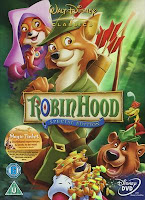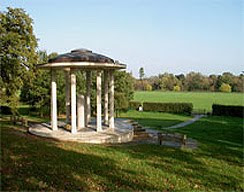Robin Hood directed by Ridley Scott, screenplay by Brian Helgeland based on a story by Brian Helgeland and Ethan Reiff & Cyrus Voris
(N.B. In order to properly discuss Robin Hood, I am forced to discuss the entire film. There will be spoilers.)
Determining intentions from watching a film is always tricky, but from my completely uninformed status as an observer, it seems to me that for Brian Helgeland, Ridley Scott and (one suspects) Russell Crowe, that making this version of Robin Hood was a highly subversive act.
The immediate consequence of their subversion is a profoundly misunderstood film. It is a fiercely intelligent film that like Russsell Crowe's Robin conceals its' brains. This has led to critics like Roger Ebert in his review, bemoaning the fact that this Robin Hood is not the "dashing swashbuckler" pf previous Robin Hood films.
I have a lot of respect for Roger Ebert, but I am going to flat-out disagree with him on this one. First of all, heroes in Ridley Scott films do not dash. In his films, heroes sweat, they get dirty and bloody, they make mistakes, but are the more heroic for having to wipe away the blood and sweat and dirt and overcome their own foibles. Even going all the way back to Ridley Scott's first film, the unjustly neglected masterpiece The Duellists
More importantly, Robin Hood is an archetype, a piece on the chessboard of film. One who has to follow certain constraints, but who can be used in many more ways than just that of the dashing swashbuckler. Not to say that Errol Flynn
Traditionally, the stories of Robin Hood break down into two halves. In the first, brighter half, Richard the Lion-Heart has been captured and is being held prisoner. Prince John controls England and drags his feet on either rescuing or ransoming his brother, the King. Robin, in addition to robbing from the rich to give to the poor, is usually the prime organizer of the collection of the ransom that will eventually release the Lion-Heart and restore him to his throne. The ultimate impotence of Prince John as an enemy is that he can do nothing truly permanent to Richard's kingdom. As long as Robin and his Merry Man can avoid being captured long enough to be hanged, they can expect a pardon from King Richard eventually.
In this first half of the Robin Hood legends, King Richard is the roi ex machina lurking in the wings, the giant reset button waiting to be pressed. Since Robin is responsible for stealing the money that will ransom his King, it is a reset that is earned, but it still limits the stakes of the Merry Men's adventures.
The second half of Robin's legends are darker. After Richard dies, John becomes King and to be blunt, at that point, Robin Hood is fucked. He is now older and his enemies are both more powerful and now permanent. Again Robin is an outlaw, but now no pardon, no mercy will ever be offered. The legend usually ends with a dying Robin firing his last arrow and asking to be buried where the arrow lands.
The only previous film to tackle this aspect of the Robin Hood legend is Richard Lester's Robin and Marian
The cruelty of the traditional legends is that Robin's life becomes more challenging and dangerous when he is too old to rise to the new challenge of Prince John becoming King John.
The genius of Ridley Scott's take on Robin Hood is that it starts the legend at the death of Richard the Lion-Heart. Crowe's Robin Hood faces the dark danger of the second-half of the legends, but is young and vital enough to rise to those challenges.
The downside to thrusting Robin into the dangers of King John's England is that it allows very little time to indulge in the tomfoolery of the medieval Three Stooges: Little John, Will Scarlet and Allan A'Dayle (played by the aptly named Newfoundlander Alan Doyle of the Great Big Sea
Equally getting short shrift is the Sheriff of Nottingham - shunted aside but for a few cameos, because Robin's true antagonist is King John (Oscar Isaac). In the first meeting between Robin and John, their relationship and the nature of John's character is neatly summarized when John removes a ring to present to Robin for bringing him the news of Richard's death (and Richard's crown) only to meanly take back the ring to cover back-taxes. It is John's lack of empathy that dooms him to be a poor King, hating Robin for being brave while John sees himself as a coward, not realizing that it is not the fear that makes a man a coward, it is overcoming that fear as John does - recklessly leading a charge - that makes a man brave.
What the film loses in pushing the Merry Men and the Sheriff into colourful background, it gains by making the bitchy back-stabbing of John's court into the engine that propels Robin Hood's plot. The politics of the film play like a highly condensed sequel to The Lion in Winter
Robin Hood's plot is busy and byzantine filled with plotting and counter-plotting, impersonations (a la The Return of Martin Guerre
Robin's tool to reform King John is a legally binding contract or charter between the King and the people and peers of England. Robin's goal is to get John to sign the "Great Charter" - the Magna Carta. In fact, Ridley Scott makes the case that Robin Hood is the living charter, literally the son of the man who wrote the first draft of the doscument. The first hint of this relationship is revealed when Robin gives himself a stigmata, pricking himself on a concealed inscription on a sword - the hidden motto of Robin's Father and the Charterists; the famous line from the trailer, "Rise, and rise again. Until lambs become lions."
If this film becomes the first in a series, we can see where the series has to end: at Runnymede, June 15th, 1215 and the signing of the Magna Carta - just as it starts in 1199 with Richard's death and John's coronation. It seems clear from the martyr's stigmata that Robin receives from his Father's inscription that while Robin Hood will fulfill his Father's quest and force John to sign the Great Charter, Robin will also not live to see the document signed, but die a martyr's death sometime before the actual signature.
In short, Robin Hood is a cinematic love letter to the Magna Carta in disguise. This is the subversive act that Ridley Scott and Brian Helgeland and Russell Crowe et al have been engaged in - singing the praises of a legal document nearly 800 years old and hiding that love letter within an action blockbuster.
When the old studio moguls ran Hollywood, making a film about an important historical moment was seen as a public service that the studios did to justify their massive control over everything we watched. And on a good day, these historical epics even made money or returned their investment by being played for generation after generation of school-kids. In today's world of soulless corporate behemoths the only way that such a film could be made is if the historical context of the story was used as sub-text: Robin Hood's Hidden History.
And if any document deserves to receive love letters, it is the Magna Carta. Without the Great Charter, there is no parliament, no common law, no US Constitution, no Bill of Rights, no Canadian Charter of Rights and Freedoms.
There is an argument to be made that without the Magna Carta circumscribing the divine right of Kings; a written document that blasphemously curtailed the power of God; without that example does Martin Luther write the 95 Theses? - Trying to curtail the power of the Church in what became the Protestant Reformation just as the Great Charter curtailed the power of the Crown.
Without the Magna Carta, there is no habeas corpus, no right of the accused to face his accusers, no right to a fair trial in front of a jury of your peers, no right not to be tortured into a coerced confession...
Seems to me that Robin Hood is a more subversive film than I thought and more necessary than I had dreamed.
(All images are copyright to their appropriate owners.)















